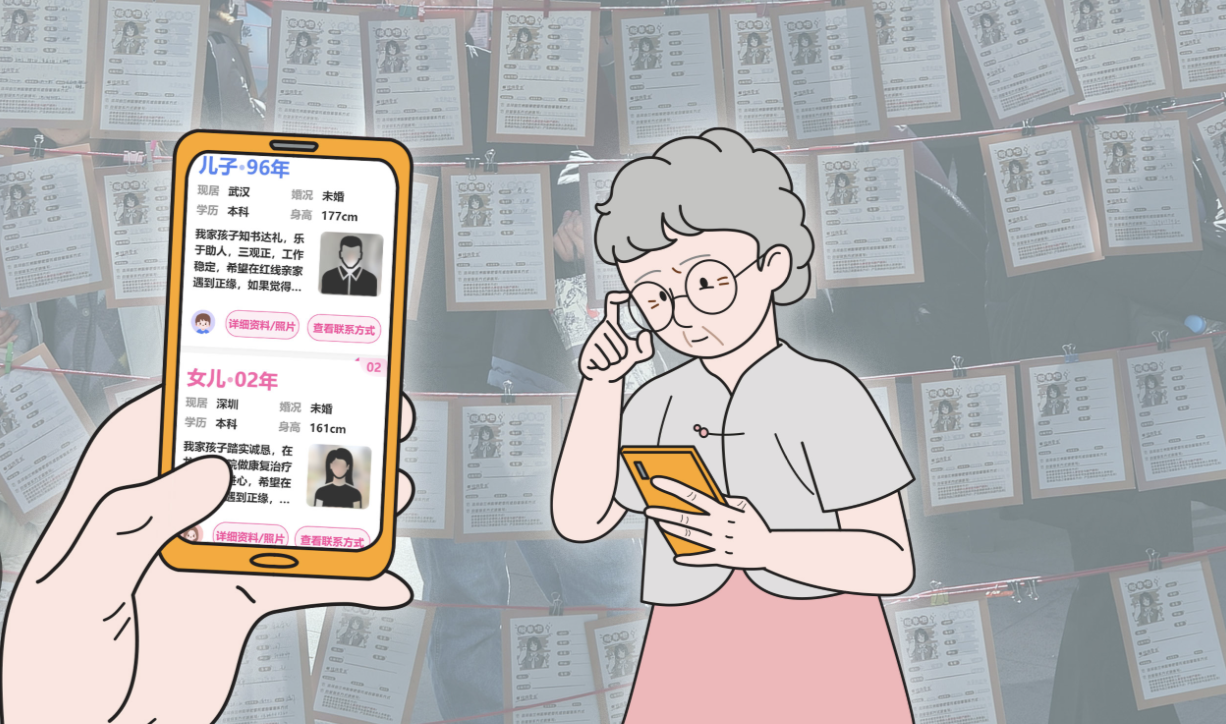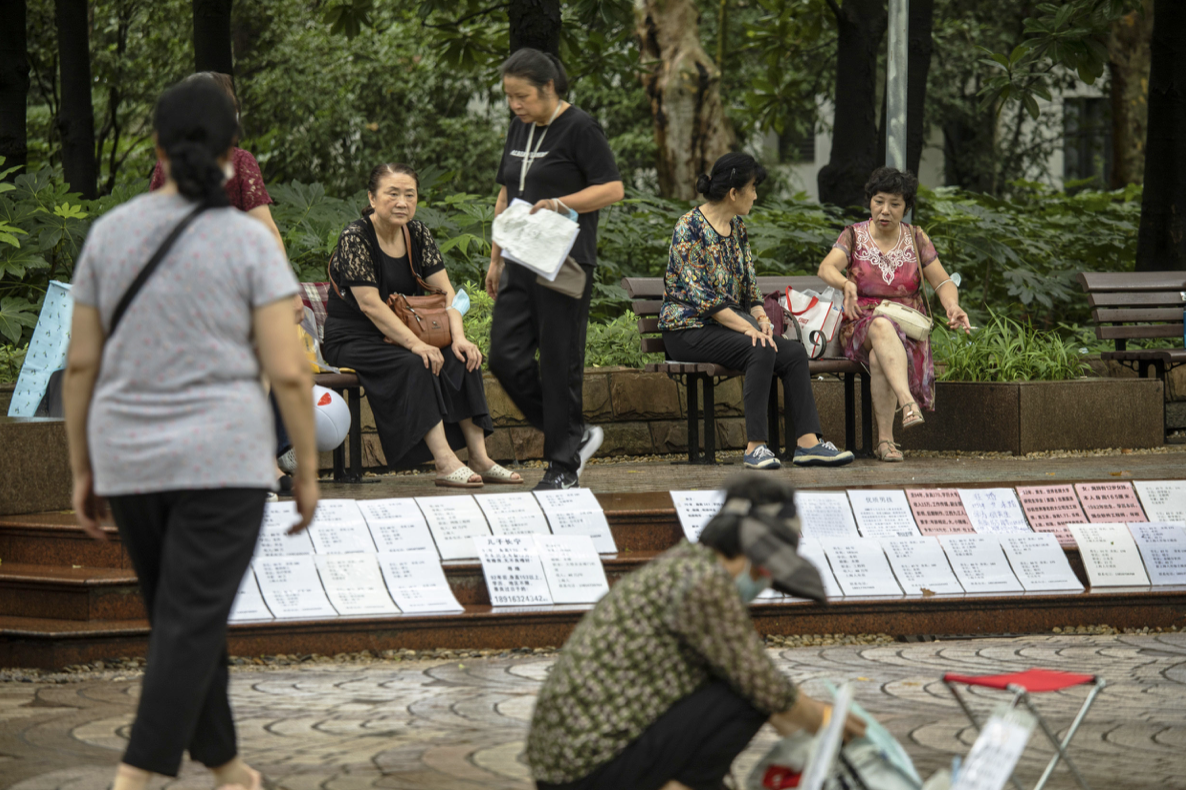On one dating app, a profile created by the parents of a woman born in 1994 reads: "College graduate, works at a construction company, earns 50,000-100,000 CNY a year, 1.7m tall, gentle and generous personality." This exemplifies a new trend in China, where parents are the primary users of dating apps, seeking suitable partners for their children.
These platforms allow parents to create profiles, filter candidates, and contact other families directly. Apps like Perfect In-laws and Family Match cater to middle-aged users with large fonts and simple interfaces. Filters prioritize practical criteria such as education, income, homeownership, and household registration (hukou). Some platforms even offer offline services like phone interviews and professional matchmaking to assess and connect families.
 |
Many Chinese parents are turning to dating apps to find in-laws, proactively screening and contacting potential families as their children delay marriage. Photo: VCG |
Many Chinese parents are turning to dating apps to find in-laws, proactively screening and contacting potential families as their children delay marriage. Photo: VCG
Declining marriage rates and an increasing number of young people delaying marriage have left parents anxious about lineage and concerned that their children are too busy or passive to find partners. While some young people accept this parental involvement, many object to the perceived control and imposition of what they consider outdated values.
Huang Yixuan, founder of the matchmaking company Jinsheng Youxing in Chengdu, says that parents have become her main client base since 2019, currently representing 65% of users. "Parents of single people aged 28-38 often feel a greater sense of urgency than their children," Huang said.
This urgency has reshaped China's online dating industry. According to iiMedia Research, the market grew from about 373 million USD in 2014 to 1.3 billion USD in 2023. Instead of encouraging their children to date, many parents are taking charge of the initial stages of courtship. Experts describe this not as arranged marriage, but as a process where "families take the first step."
While the final decision may still rest with the children, much of the process has already unfolded. In most families, the outcome is a compromise: parental pressure, filial resistance, and eventual mutual adjustment.
27-year-old Nancy Xu from Guangdong was taken aback when her parents sent her a series of profiles of potential suitors via WeChat with the message: "Take a look when you're free." "Parents screen the candidates first and only tell their children when they find a suitable match," she explained.
Xu's parents send her a new profile daily. Her brief replies are met with complaints about her lack of effort. They even criticize her texting style as stiff, comparing it to their enthusiastic interactions with the other families. "The constant pressure is suffocating," Xu said.
Despite her objections, Xu admits that her parents' choices often have better financial stability because they prioritize education and family background, factors that Xu and her friends value less than physical appearance.
This prioritization is shared by many parents offline, but not everyone embraces digital intermediaries. On a weekend in May, dozens of parents gathered at the matchmaking corner in Shanghai People's Park. Of the 17 interviewed, only three had used dating apps. "You can't trust the profiles," one mother said. Most believe that face-to-face meetings remain more honest and serious.
Others are cautiously experimenting. 52-year-old Li Dengyun from Anhui province spent a year searching for a partner for her 26-year-old daughter. Her daughter wasn't in a hurry, but Li was. Starting with inquiries among friends and relatives, Li turned to the Family Match app when those leads dried up. While intrigued by the list of well-educated and employed candidates, she remained hesitant due to fears of scams. Ultimately, she only posted her daughter's profile as a tentative first step.
 |
Parents display matchmaking profiles for their children at People's Park in Shanghai, 2023. Photo: Qilai Shen/Bloomberg/VCG |
Parents display matchmaking profiles for their children at People's Park in Shanghai, 2023. Photo: Qilai Shen/Bloomberg/VCG
On the Hongxian Qinjia app, parents enter information, verify their identities, and receive 20 suggested profiles daily. To expedite the process, they can pay for "Super Recommendation" packages or an annual membership (365 CNY) to unlock perks like unlimited messaging and contact.
"After parents understand the service, they often actively introduce their children. This model significantly increases the success rate," said Huang, the app's founder. She highlighted two couples who married after only 35-41 days of meeting, attributed to the families' similar backgrounds. In the Chinese marriage market, the principle of matching social status still carries significant weight.
Sociologist Du Shichao from Fudan University sees this as a new development in China's long history of matchmaking, evolving from arranged marriages to direct introductions and now online platforms.
However, he believes these platforms function more like negotiations than dating. "These are two separate digital worlds. I think the parents are just entertaining themselves," Du said, while emphasizing that the final decision still rests with the children, although they are not immune to pressure.
This rings true for Nancy Xu. She recently broke up with her boyfriend after her parents deemed his family unsuitable. When they urged her to "find the next one immediately," she retorted: "Why don't you just choose someone and have me sign the marriage certificate?" Now, they threaten to cut off financial support if she doesn't cooperate. "When I'm financially independent, I won't have to compromise. But right now, I have no say," Xu said.
Minh Phuong (SixthTone)












